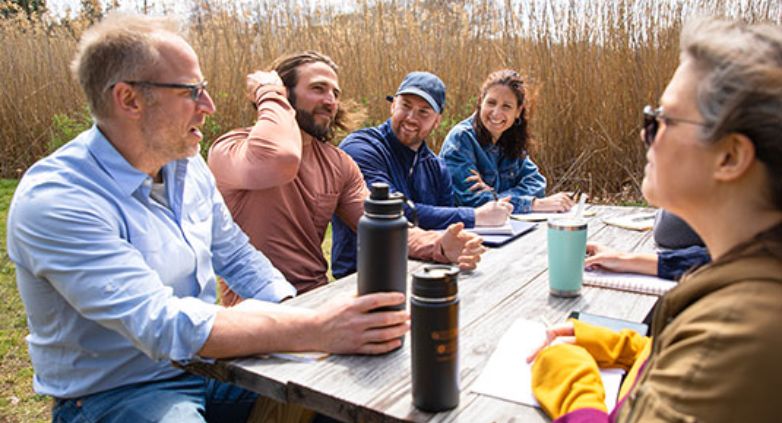
How to Help an Alcoholic Family Member – 8 Essential Steps
Alcoholism affects millions of families worldwide, with studies showing that almost 19 million children in the U.S. live with at least one parent who struggles with alcohol addiction.
To help an alcoholic family member you should offer compassionate support while encouraging treatment and healthy boundaries, all while educating yourself about addiction and prioritizing your own well-being. It involves being a steady presence throughout their recovery journey without trying to control it.
This article offers a practical, compassionate guide to help you assist your loved ones in the battle against alcohol addiction.
How to help an alcoholic family member?
- Educate Yourself
- Prepare Yourself Emotionally
- Plan the Conversation
- Conduct the Conversation
- Offer Support
- Plan an Intervention
- Support Their Recovery Journey
- Handle Relapses with Care
Real people. Real support.
Seeking Help for Yourself or a Loved One?
Connect with our professionals to start the journey to recovery.
Call 860.388.9656 for immediate support.
Keep reading to learn more about each step and how you can best support your loved one through their journey.

1. Educate Yourself
Supporting a loved one with alcoholism begins by understanding Alcohol Use Disorder (AUD).
Unlike occasional heavy drinking, AUD is a chronic medical condition that alters brain function and behavior. As a result, people living with AUD often struggle to control their drinking, even when it causes serious consequences in their lives.
By recognizing that AUD is a medical illness—not a moral failing—you can begin to let go of frustration and approach your loved one with greater empathy and compassion.
Key AUD Symptoms to Recognize
It’s essential to familiarize yourself with the signs of AUD. Some common symptoms include:
- Strong cravings to drink, even when not socially appropriate
- Difficulty controlling alcohol intake, even after attempting to reduce it
- Withdrawal symptoms, such as anxiety, sweating, or shakiness when alcohol isn’t available
- Persistent drinking despite worsening health, damaged relationships, or declining job performance
By recognizing these symptoms, you’ll be better equipped to support your loved one with compassion and understanding.
Research Treatment Options
After grasping the nature of AUD, explore the various treatment options available. Each individual’s journey to recovery may look different, so it’s important to know what resources exist:
- Outpatient Programs: These offer counseling and therapy while allowing the person to live at home and continue with daily responsibilities.
- Inpatient Rehabilitation: This involves intensive treatment in a structured environment, typically for those who need full-time support to break their addiction.
- Detox Services: Medical supervision is available to safely manage the symptoms of alcohol withdrawal, which can sometimes be dangerous.
Researching these treatment methods ensures you have valuable information. This helps when discussing how to help an alcoholic family member, empowering you to guide them toward the best professional help.
Contact Project Courage today to learn more about personalized treatment options for your loved one.
Free Download
Proven Programs for Lasting Recovery
Receive your free guide to understanding alcohol addiction and discovering recovery programs tailored to you. Learn how to build a personal sobriety plan and get support every step of the way.
2. Prepare Yourself Emotionally
Supporting a loved one with alcoholism is both emotionally and mentally demanding.
Before you step into this role, it’s essential to prepare yourself so you can be there for them while also protecting your own well-being.
Set Realistic Expectations
Recovery from alcohol addiction is not a quick or linear process. It’s crucial to set realistic expectations right from the start.
Understand that recovery will likely include relapses, setbacks, and moments of resistance.
There may be days of progress followed by difficult periods where your loved one struggles or even denies their problem.
Accepting that these challenges are part of the journey helps you stay grounded and prevents discouragement.
Some realistic expectations to keep in mind:
- Recovery takes time: There is no fixed timeline; patience is essential.
- Setbacks happen: Relapses are a common part of the recovery process, not a failure.
- Your role is supportive, not controlling: You can’t “fix” your loved one, but you can be a source of stability.
Stay Patient and Compassionate
One of the hardest parts of supporting someone through alcoholism is maintaining patience and compassion, especially when your efforts aren’t immediately rewarded.
Your loved one may resist help, deny their problem, or become defensive. In these moments, it’s crucial to avoid frustration or anger.
Instead, remind yourself that alcoholism is a disease, not a moral failing.
Staying patient and compassionate allows you to respond to setbacks with understanding rather than judgment.
Even when progress seems slow or nonexistent, your consistent support and empathy can make a significant difference in their journey.

3. Plan the Conversation
When approaching a loved one about their alcohol use, the way you communicate can significantly impact the outcome.
Planning the conversation carefully is essential to ensure that it’s constructive, respectful, and compassionate.
Choose the Right Time and Place
Timing and setting matter greatly when discussing a sensitive topic like alcoholism. Choose a moment when your loved one is sober, calm, and in a relatively good frame of mind.
Avoid bringing it up during or after an argument, or when they are under the influence of alcohol, as this could lead to defensiveness or anger.
Consider a quiet, private place where you won’t be interrupted.
A comfortable, familiar environment can help when learning how to help an alcoholic family member.
The goal is to make the conversation feel supportive, not confrontational.
Good practices for choosing the setting:
- Private and comfortable location: Somewhere familiar where your loved one feels safe.
- No distractions: Ensure there are no interruptions, such as phones, TVs, or other people.
- Neutral and calm timing: Choose a moment when your loved one is sober and relaxed.
Use “I” Statements (While expressing your concerns)
When expressing your concerns, it’s important to use “I” statements rather than “you” statements.
This approach makes your loved one feel less attacked or blamed, allowing for a more productive conversation.
“I” statements focus on your feelings and observations without casting judgment, which helps reduce defensiveness.
For example:
- Instead of saying, “You’re drinking too much and it’s ruining everything,” try: “I’ve noticed that your drinking has been affecting our family, and I’m really worried about you.”
- Instead of, “You need to stop drinking,” say: “I care about you, and I’m concerned about how much you’ve been drinking lately.”
This subtle shift in language creates a space for dialogue, making your loved one more likely to listen and engage in the conversation without feeling attacked.
If you want to go in more detail on this topic, read our article on how to talk to a family member about their addiction.

4. Conduct the Conversation
Once you’ve planned the conversation and chosen the right moment, how you actually conduct it is crucial.
The way you communicate can either open the door to change or cause your loved one to shut down.
It’s important to be both honest and compassionate, while avoiding tactics that might escalate tension or create resistance.
Be Honest and Compassionate
When discussing your concerns, honesty is key—but it must be paired with compassion.
Speak from the heart and let your loved one know that your words come from a place of care and concern, not judgment or anger.
Share your observations openly but gently, focusing on how their drinking has affected you and others around them.
For example:
- Honest: “I’ve noticed you’ve been drinking a lot more lately, and it’s been affecting your health and our relationship.”
- Compassionate: “I care about you deeply, and I want to support you through whatever you’re going through.”
By balancing honesty with kindness, you can help when learning how to help an alcoholic family member feel supported rather than attacked, which may make them more receptive to the idea of seeking help.
Avoid Ultimatums
It’s tempting to issue ultimatums when you feel frustrated or hurt, but this can often backfire.
Saying things like “If you don’t stop drinking, I’m leaving” or “You have to choose between alcohol and me” may push your loved one into a defensive corner and make them less likely to change.
Instead of ultimatums, focus on expressing your concerns and offering support.
Let them know you’re there to help and that they have options for recovery.
If boundaries are necessary, communicate them calmly and clearly, but avoid framing them as threats.
For instance:
- Avoid: “If you don’t stop drinking, I’m done.”
- Try: “I’m really worried about your drinking and how it’s affecting us. I’m here to help you, but I also need to take care of myself.”
By steering clear of ultimatums, you foster an atmosphere of understanding and support, which is more conducive to positive change.
Ready to take the next step?
Reach out to Project Courage for a confidential consultation.

5. Offer Support
Once the conversation is underway, offering support is the next critical step.
It’s important to express that you’re there for your loved one and that they don’t have to face their struggles alone.
By encouraging them to seek professional help and staying actively involved in their recovery journey, you can make a significant difference in their path to healing.
Encourage Professional Help
While your support is crucial, professional help is often necessary for lasting recovery from alcohol addiction.
Encourage your loved one to seek out qualified professionals who can guide them through detoxification, counseling, and long-term treatment options.
This could include reaching out to a therapist, attending support groups like Alcoholics Anonymous (AA), or entering a rehabilitation program.
Gently remind them that seeking help is not a sign of weakness but a brave and necessary step toward getting better.
Offer to assist them in finding treatment options or accompany them to their first appointment to make the process less intimidating.
Ways to encourage professional help:
- Provide information: Share details about local treatment centers, therapists, or support groups.
- Offer to help: Assist them in making appointments or navigating insurance coverage.
- Accompany them: Offer to attend their first therapy session or support group meeting with them.
Be Involved
Your ongoing involvement can make a powerful difference when learning how to help an alcoholic family member.
Show that you’re committed to supporting them, not just in the short term, but throughout their entire journey.
This may involve attending family therapy sessions, checking in regularly, or helping them maintain a healthy, supportive environment.
Being involved doesn’t mean controlling their recovery, but rather offering encouragement, accountability, and emotional support when needed.
Celebrate their successes, no matter how small, and remind them that they are not alone in their fight against addiction.
Ways to stay involved:
- Attend support meetings: Join family sessions or attend Al-Anon meetings to better understand addiction.
- Offer regular check-ins: Keep open lines of communication and check in on their progress.
- Create a supportive environment: Help eliminate alcohol-related triggers from their surroundings.
By being actively engaged in their recovery process, you reinforce your commitment to their well-being and help them build a solid foundation for long-term success.
Real people. Real support.
Seeking Help for Yourself or a Loved One?
Connect with our professionals to start the journey to recovery.
Call 860.388.9656 for immediate support.

6. Plan an Intervention
If your loved one continues to deny their problem or refuses to seek help despite your efforts, an intervention may be necessary.
An intervention is a structured, carefully planned event where close friends and family come together to express their concerns in a supportive yet firm manner.
This can help your loved one realize the gravity of their situation and motivate them to seek professional help.
Seek Professional Guidance
Interventions are delicate and often emotionally charged, so it’s highly recommended to seek professional guidance.
A trained interventionist or counselor can help you plan the intervention in a way that is effective and minimizes the risk of conflict or defensiveness.
These professionals are skilled in handling the complex emotions involved and can provide strategies to keep the conversation focused and constructive.
Steps to take with professional guidance:
- Consult an interventionist: Reach out to someone with experience in guiding families through interventions.
- Follow a structured plan: Ensure that everyone involved knows their role and how to communicate their concerns effectively.
- Prepare for different outcomes: Have a plan in place for what happens if your loved one refuses help, such as next steps or boundaries to maintain.
Prepare a Team that Includes Close Friends and Family Members
An effective intervention requires a team of people who genuinely care about the person struggling with alcoholism.
Choose individuals who have a positive influence and who your loved one respects.
Ideally, the team should include a mix of close family members and trusted friends who can speak to the emotional, social, and health impacts of their drinking.
Once you’ve assembled the team, work together to rehearse what each person will say.
The focus should be on expressing concern and offering support, rather than placing blame or issuing threats.
Each person should speak from their personal experiences and feelings, using “I” statements to avoid making the individual feel attacked.
Tips for preparing the team:
- Choose people carefully: Include those who have a strong, positive relationship with your loved one.
- Rehearse the intervention: Have each person plan their statements, focusing on how the loved one’s behavior has impacted them personally.
- Stay united: Ensure that the team presents a consistent message and avoids conflicting statements or emotional outbursts.
By organizing a well-planned intervention with the guidance of a professional, you increase the chances of encouraging your loved one to accept the help they need.
Get expert support and guidance—call Project Courage now for more information.

7. Support Their Recovery Journey
Once you’ve learned how to help an alcoholic family member and they begin their recovery, your role doesn’t end—it shifts.
Supporting them throughout their recovery journey is crucial to helping them maintain long-term sobriety.
Your encouragement and commitment can make a significant difference in their ability to stay on track and rebuild their life.
Create a Supportive Environment
A key part of supporting recovery is creating an environment that encourages sobriety.
This means making sure their surroundings are free of temptations and triggers.
Remove alcohol from the home, and help them develop new, healthy routines that support their goals.
Encourage activities that don’t involve alcohol, such as exercising, hobbies, or spending time outdoors.
Additionally, fostering open communication is essential. Let them know they can talk to you about their struggles without judgment.
Providing a sense of safety and understanding will help them stay motivated during difficult times.
Ways to create a supportive environment:
- Eliminate alcohol from the home: Make your space alcohol-free to reduce temptation.
- Encourage positive activities: Promote healthy habits, such as exercise, hobbies, and relaxation techniques.
- Foster open communication: Be available to listen without judgment, allowing them to express their feelings and concerns.
Attend Support Groups
Recovery is a challenging process, and it’s important for both you and your loved one to have a support network.
Encourage them to attend support groups like Alcoholics Anonymous (AA), which can provide valuable peer support and accountability.
Similarly, family members can benefit from attending groups like Al-Anon or Alateen, which are designed to help those affected by a loved one’s alcoholism.
Attending support groups allows you to connect with others who are going through similar experiences.
These groups can offer practical advice, emotional support, and a sense of community.
By staying involved in support groups, both you and your loved one will have a stronger foundation to sustain long-term recovery.
Benefits of attending support groups:
- Peer support: Your loved one will meet others who understand their struggles and can provide encouragement.
- Accountability: Regular meetings help keep them accountable for their recovery progress.
- Family support: Al-Anon and similar groups offer emotional support and coping strategies for family members.
By creating a nurturing environment and staying engaged with support networks, you can help your loved one stay committed to their recovery and build a healthier, happier future.

8. Handle Relapses with Care
On average, two-thirds of individuals treated for alcohol use disorder (AUD) relapse within six months.
Relapses are a common part of the recovery journey, and though they can be discouraging, learning how to help an alcoholic family member through them with understanding and care is essential.
How you respond during these moments can greatly influence your loved one’s path forward.
By staying supportive and helping them get back on track, you can reinforce their commitment to recovery.
Stay Positive and Supportive
When a relapse occurs, it’s natural to feel disappointed or frustrated. However, it’s important to stay calm and maintain a positive, supportive attitude.
Instead of expressing anger or disappointment, offer reassurance that relapse doesn’t mean failure—it’s a bump in the road that many people experience during recovery.
Remind your loved one that setbacks are part of the process, and what matters most is how they respond moving forward.
Offer words of encouragement and let them know you believe in their ability to overcome this challenge.
Ways to stay positive and supportive:
- Remain calm: Avoid reacting with anger or frustration.
- Reassure them: Let them know that relapse is common and doesn’t define their recovery.
- Express belief in them: Remind them of the progress they’ve made and encourage them to continue.
Encourage Returning to Treatment
If a relapse occurs, it’s crucial to urge your loved one to re engage with treatment.
Whether it’s reconnecting with their therapist, attending more frequent support group meetings, or revisiting a rehabilitation program, getting back on track as quickly as possible can prevent further setbacks.
Gently remind them that returning to treatment is not a step backward but an opportunity to reinforce the strategies that helped them in the first place.
Offer to help them make the necessary arrangements and provide emotional support as they re-engage in their recovery process.
Steps to encourage returning to treatment:
- Reaffirm the importance of treatment: Remind them that treatment is a valuable tool for regaining control.
- Help with logistics: Offer to schedule appointments or attend meetings with them.
- Support their decision: Reinforce that seeking additional help is a sign of strength, not weakness.
By handling relapses with care, you can help your loved one see that recovery is a continuous process. Staying supportive and encouraging them to seek help again will give them the confidence to move forward with their journey.

Treatment and Rehabilitation Options to help an alcoholic family member
When you’re learning how to help an alcoholic family member and they are ready to seek help for their addiction, understanding the available treatment and rehabilitation options can guide them toward the right path.
Different programs offer varying levels of support, and finding the best fit can make a significant impact on their recovery.
Here are some key options to consider:
Intensive Outpatient Programs (IOP)
Intensive Outpatient Programs (IOP) are designed for individuals who need structured support but do not require 24/7 supervision.
These programs allow participants to continue living at home while attending several hours of therapy and counseling sessions each week.
IOPs are ideal for those who have completed inpatient treatment or for individuals who need intensive support but have family, work, or school commitments.
Benefits of IOP:
- Flexible scheduling: Participants can attend therapy sessions while maintaining daily responsibilities.
- Structured support: Provides a solid framework for maintaining sobriety through regular therapy, group sessions, and skill-building exercises.
- Continuity of care: Often serves as a step-down option from inpatient programs, offering continued support.
In-Home Recovery Services
In-home recovery services bring treatment to the comfort of the home, providing a flexible option for those who prefer a more private approach to recovery.
These services may include one-on-one counseling, medical supervision, and support tailored to the individual’s needs.
This can be particularly beneficial for individuals who face barriers to attending traditional treatment settings, such as mobility issues or social anxiety.
Benefits of In-Home Recovery Services:
- Privacy: Allows individuals to receive care without leaving their home, which can be more comfortable and less stigmatizing.
- Personalized care: Services are tailored to the specific needs of the individual, allowing for a more customized approach.
- Convenience: Ideal for those with scheduling conflicts or transportation issues, offering flexibility and ease of access.
Family Services
Family services are a crucial aspect of alcohol addiction treatment, recognizing that addiction affects not only the individual but the entire family.
These services offer counseling and education for family members to help them understand addiction, develop healthy coping mechanisms, and learn how to support their loved one without enabling harmful behavior.
Family services may include family therapy sessions, educational workshops, and support groups for family members.
By involving the family in the recovery process, these services help create a supportive and healing environment that can aid in long-term sobriety.
Benefits of Family Services:
- Family healing:Focuses on repairing the emotional and relationship strain that addiction has caused within the family.
- Education and support: Helps family members understand addiction and learn how to support their loved one in healthy, constructive ways.
- Improved communication: Strengthens family bonds and fosters healthier communication, which is essential for the recovery process.
Each of these treatment options provides valuable support tailored to the unique needs of your loved one, helping them take meaningful steps toward lasting recovery.
Explore how Project Courage can help—schedule a consultation with our experienced team today.

Benefits of Treating Alcohol Addiction at Project Courage
Choosing the right treatment facility is a critical step in helping your loved one overcome alcohol addiction.
Project Courage offers a range of benefits that make it an ideal place for individuals seeking recovery:
- Personalized Care: The website emphasizes individualized care, recognizing that each person’s story and journey are unique.
- Comprehensive Programs: Project Courage offers a range of services, including Intensive Outpatient Programs (IOP), In-Home Recovery Services, and Family Services, which indicate comprehensive treatment options.
- Family Involvement: The site clearly states that addiction is a “family disease” and highlights the importance of family services in the treatment process.
- Expert Staff: The “Our Staff” section showcases a team of highly qualified professionals dedicated to helping individuals through addiction recovery.
- Holistic Approach: The website mentions using various therapeutic models, including internal family systems and stages of change, which indicate a holistic treatment method addressing multiple aspects of recovery.
- Flexible Scheduling: The availability of different program options, like IOP and in-home services, supports flexible scheduling.
- Supportive Environment: Project Courage focuses on creating a welcoming and compassionate community for recovery.
- Ongoing Support: The commitment to long-term care and minimizing treatment barriers suggests ongoing support for clients.
These benefits make Project Courage a comprehensive and compassionate choice for anyone looking to break free from alcohol addiction and build a healthier future.
FAQs
The final stage of alcoholism is late-stage or end-stage alcoholism, where individuals experience a loss of control over drinking, severe physical and mental health issues, and often require intensive medical and therapeutic intervention.
The best way is to encourage the alcoholic to seek professional treatment while also involving the family in therapy or support groups to promote healing, education, and healthy boundaries.
Late-stage alcoholism is typically the hardest to recover from due to the deep physical dependence, denial, and potential damage to relationships and health.
Approach them with empathy, express concern without judgment, and guide them toward professional help—while staying consistent, supportive, and maintaining healthy boundaries.
Intensive Outpatient Programs (IOP) and Family Therapy are two effective options that provide structured support for the individual and healing tools for the entire family system.
Free Download
Proven Programs for Lasting Recovery
Receive your free guide to understanding alcohol addiction and discovering recovery programs tailored to you. Learn how to build a personal sobriety plan and get support every step of the way.
Conclusion
Helping a loved one with alcohol addiction requires understanding, patience, and ongoing support.
Learning how to help an alcoholic family member by educating yourself, preparing emotionally, and offering compassionate guidance allows you to play a crucial role in their recovery.
Whether through encouraging treatment, planning an intervention, or supporting their journey, your involvement matters.
For personalized, comprehensive care, Project Courage offers expert staff, holistic programs, and family involvement.If you’re ready to take the next step in helping your loved one find lasting recovery, Project Courage is here to guide you. Reach out today—because healing starts with courage.


